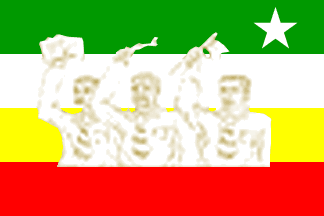 image by António MARTINS-Tuválkin, 18 Oct 2008
image by António MARTINS-Tuválkin, 18 Oct 2008 
Last modified: 2014-04-26 by bruce berry
Keywords: angola | prd | pdp-ana |
Links: FOTW homepage |
search |
disclaimer and copyright |
write us |
mirrors
 image by António MARTINS-Tuválkin, 18 Oct 2008
image by António MARTINS-Tuválkin, 18 Oct 2008
The Fórum Fraternal Angolano Coligação or FOFAC (Angolan Fraternal Forum
Alliance) got the least number of votes in the 2008 Angolan parliamentary when
it got 0,17% of the popular vote. According to the Chr. Michelsen Institute in
Norway:
The Fórum Fraternal Angolano Coligação (Fraternal Forum of Angola
Alliance) is an alliance of four small parties, established in 1997and approved
by the Constitutional Court in July 2008. The coalition president is Artur
Quixona Finda. In its manifesto FOFAC prioritises “the various cultural,
political, social and historical problems facing Angolans today”. It says
it will fight for greater economic equality and the restructure of public/
political institutions, and can thus be seen as a radical reform party.
On the National Electoral Committee
official website the party flag is shown as being ~2:3 with four horizontal
stripes — green, white, yellow, and red; a white five-pointed regular upright
star is placed on the upper fly inside the green stripe and overall, slightly
overlapping the green and red stripes an image of three men, seen from waist up,
facing slightly to the left of the observer, all mustached and dressed in shirt
and stripped ties, raising their right arms while holding respectively a sheaf
of papers (hoist side), a small hand tool (middle), and a small white forked
flag (fly side) — this image is in sepia drawn in white.
António MARTINS-Tuválkin, 18 Oct 2008
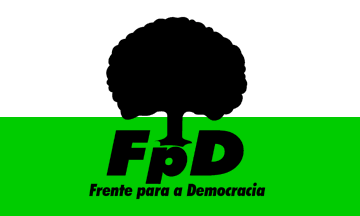 image
by
António MARTINS-Tuválkin, 14 Oct 2008
image
by
António MARTINS-Tuválkin, 14 Oct 2008
The Frente para a Democracia or FpD (Front for Democracy) is a small
Angolan political party, one of the many which did not win any seats in the 2008
parliamentary elections. The Chr. Michelsen Institute in Norway reports
that:
The Frente para a Democracia (Front for Democracy) is an “intellectual”,
relatively radical opposition party, which is strongest in the urban,
intellectual milieu of Luanda, Cabinda and Benguela. It has a good working
relationship with civil society organisations, trade unions and NGOs. The party
president is Filomeno Vieira Lopes. The party was previously part of various
coalitions (and had one deputy as a member of the AC Coligação) but now it runs
on its own ticket. The FpD is strongly committed to democracy, pluralism and the
protection of citizens’ and human rights. The internal party structure and
democracy is good.
On the National Electoral Committee
official website the party flag is shown as a ~2:3 horizontal bicolour of white
over yellowish light green with a black centered emblem — this comprises a
tree outline above large lettering "FpD" in turn above smaller letters "Frente
para a Democracia", all set in extra bold sans-serif italics (seems to be Futura
Extra Bold Condensed Italic).
António MARTINS-Tuválkin, 14 Oct 2008
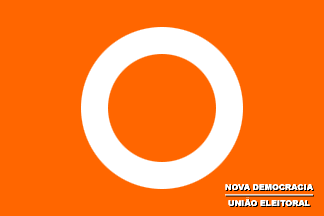 image by António MARTINS-Tuválkin, 12 Oct 2008
image by António MARTINS-Tuválkin, 12 Oct 2008
Nova Democracia União Eleitoral or N.D.-U.E (The Social Renewal Party) is one
of the smaller parties with seats in the Angolan parliament following the 2008 parliamentary elections when it got the 3rd place in popular vote but
is
4th in the number of elected MPs gaining two seats out of 220 due to the regional
allocation of the ballot.
The Chr. Michelsen Institute in Norway reports that:
The Nova Democracia União Eleitoral (New Democracy Electoral Union) is a recently established coalition of six parties. Their registration was approved by the Constitutional Court in July 2008. Most of these parties used to belong to the POC coalition, which they quit due to internal disagreements. The leader is Quintino de Moreira, president of the member party MPDA.
On the National Electoral Committee
official website the party flag is ~2:3 orange with a thick white ring and
what seems to be the party name at the lower fly, set in two lines
separated by a horizontal line with bold sans-serif capitals, all white with
black shadow.
António MARTINS-Tuválkin, 12 Oct 2008
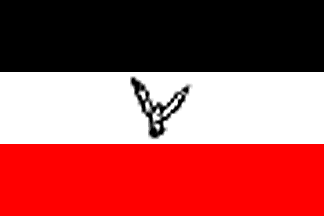 image by António MARTINS-Tuválkin, 14 Oct 2008
image by António MARTINS-Tuválkin, 14 Oct 2008
The Partido de Apoio Democrático e Progresso de Angola or PADEPA (Party
for Democratic Support and Progress of Angola) is a small Angolan party, one of
the many which did not get any seats in the parliament following the the 2008
parliamentary elections.
The Chr. Michelsen Institute in Norway reports that:
PADEPA, Partido de Apoio Democrático e Progresso de Angola (Party of
Democratic Support for Democracy and Progress in Angola) was registered as a
political party in 1995, and approved as a contestant in the 2008 elections.
PADEPA used to be a radical opposition party, but since an internal split that
led to the expulsion of its founding president Carlos Leitão in 2007, the party
line is unclear. Luís Silva Cardoso currently chairs the party.
On the National Electoral Committee
official website its flag is a ~2:3 horizontal tricolor of black, white and red
with a black and white soaring bird centered on the white panel.
António MARTINS-Tuválkin, 14 Oct 2008
The PDP-ANA is a right-of-center humanist grouping led by a prominent
university professor, Nfulumpinga Lando Victor, who was previously affiliated
with the FNLA. In mid-1992 Victor was named as a presidential candidate.
However there were no reports of his having received any votes in the September
balloting, following which the party secured one seat in the Angolan National
Assembly.
Jarig Bakker, 30 Nov 2001
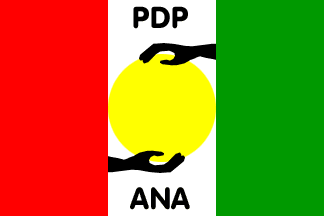 image by António MARTINS-Tuválkin, 12 Oct 2008
image by António MARTINS-Tuválkin, 12 Oct 2008
In the 2008
parliamentary elections the P.D.P.-ANA had the best
result of those parties with no previously elected Members of Parliament.
The Chr. Michelsen Institute in Norway, reports that:
PDP-ANA, Partido Democrático para o Progresso de Aliança Nacional de Angola
(Democratic Progress Party/Angolan National Alliance) is a moderate opposition
party and a member of the current coalition government (although it supported
UNITA’s Savimbi for the Presidency in 1992). The Party President is Sediangani
Mbimbi. The party has an ethnic support base with the Bakongo ethnic
groups and “French-speaking” northerners along the border with the
DRC, and is
close to the Protestant and Baptist churches. In the election campaign,
the PDP-ANA talks about national reconciliation, education and the family as
important institutions. The party structure is client centred and
traditional.
On the National Electoral Committee
official website the party's flag is a ~2:3 vertical tricolor of red, white, and
green with the middle panel filled with a large, tangent yellow disc, held above
and below by two black hand outlines, the upper one “issuant” from the green
division line and the upper one “issuant” from the red division line; centered
above it the lettering "PDP" and below it "ANA", both set in black sans-serif
rounded bold capitals.
António MARTINS-Tuválkin, 12 Oct 2008
The PRD was formed by survivors and sympathizers of the dissident
MPLA-PT
Nito Alves faction whose abortive 1977 coup d'etat led to a violent purge of the
parent party leadership. In 1991 the PRD was reported to be regarded by
Luanda's diplomatic community as the best organized of the "emergent" parties.
In September 1991 the PRD was the first party sanctioned by the Supreme
Court to begin gathering the signatures necessary to secure legal status.
In July 1992 PRD leader Luís da Silva dos Passos predicted that
the PRD would win 20 percent of the vote at the forthcoming elections and
then align with UNITA. However, Dos Passos' presidential vote share was
less than 2 percent, with the party capturing only seat in the Angolan National
Assembly
Jarig Bakker, 30 Nov 2001
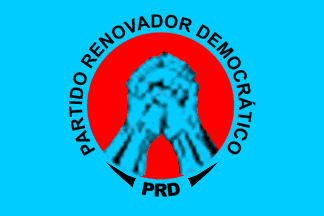 image by António MARTINS-Tuválkin, 17 Oct 2008
image by António MARTINS-Tuválkin, 17 Oct 2008
The Partido Renovador Democrático or PRD (Democratic Renewal Party) is
the third largest Angolan political party having won eight seats in the 220 seat
parliament in the 2008 parliamentary elections. According to the Chr. Michelsen
Institute in Norway:
The Partido Renovador Democrático (Democratic Renewal Party) was founded
by a group of MPLA people who were purged and exiled after a failed coup in
1977. The party has been subject to several splits and has a leadership problem.
The PRD gets its main support from urban and semi-urban areas. It is a part of
the current coalition government, and is led by Luís da Silva dos Passos.
On the National Electoral Committee official website its flag is shown as a ~2:3
very light blue flag with a large red disc containing its logo which is a pair
of hands clasped upwards, in the same blue, with black shadows, and the disc is
surrounded by lettering, set in black sans-serif capitals. From 7 to 5
o’clock it reads "Partido Renovador Democrático" and in bold type "PRD" arched
and centered at the bottom, flanked by two long black triangles, separating it
from the remaining lettering.
António MARTINS-Tuválkin, 17 Oct 2008
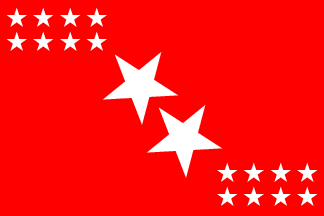 image by António MARTINS-Tuválkin, 12 Oct 2008
image by António MARTINS-Tuválkin, 12 Oct 2008
Plataforma Política Eleitoral (Platform for Electoral Politics)
is the party which gained the second lowest number of votes in the 2008 parliamentary elections in Angola.
The Chr. Michelsen Institute in Norway reports that:
The Plataforma Política Eleitoral of PPE (Platform for Electoral Politics) is a recently established alliance (coalition) of nine micro-parties chaired by José João Manuel. The PPE
emphasizes industrial development, reform of government structures and service delivery. Like other coalitions it is vulnerable to
divisions. Being quite new and unknown to the public, the PPE stands little chance of gaining parliamentary seats.
On the National Electoral Committee
official website the party flag is red with a total of 18 white regular five-pointed stars: A block of 2×4 smaller upright stars at the upper
hoist, and another at bottom fly; on the center two larger white stars
pointing to the upper hoist and loosely set on the descending diagonal of
the flag.
António MARTINS-Tuválkin, 12 Oct 2008